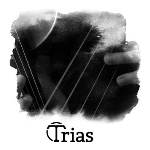On playing the tune on bass, being dragged to folk dancing by your mother, and respecting the tradition on your own terms.
It may be hard to discern as they stand there in the harsh stage lighting, calm, assured and deeply concentrated, but the four young musicians in Trias are the cream of the new generation of Danish folk musicians.
They won the Danish folk music championships in 2011 and their debut album, Trias, appeared in October 2012. The album, which is rapturously reviewed both in Denmark and abroad, has 12 new compositions and 2 traditional Danish dance tunes. In late 2012 Trias won a Danish Music Award (Danish "Grammy"), as New Talent of the Year.
Concentration and Humour
The little folk club in Denmark's fourth largest town, Odense on Funen, is chock-a-block with folk of all ages. On stage, Jonas Kongsted and Cristoffer Dam Thorhauge on violin and viola, Rasmus Nielsen on violin, harmonium and piano, and Søren Østergaard on double bass, are all beaming with the joy of playing music.
They play in a relaxed, liberated manner. The strings send tones twisting around each other, laden with grace notes and decorations, the bass lays down the fundaments in a blend of folk and jazz phrasing and the old harmonium binds it all together in a sound that is surprisingly and simultaneously ancient and modern, both nostalgic and avant-garde. The tempo is up, the temperature is up, concentration on stage is intense and the audience are in a great mood.
In the course of a few years, Trias has developed from trio to quartet, and from the Danish folk dance scene to the international concert scene. In the years to come we will meet them in clubs and at festivals in Europe and the rest of the world, all due to the integrity and self-confidence of their debut album, Trias. But it all started with traditional Danish fiddle music, says Rasmus Nielsen when I find him and bassist Søren Østergaard in Copenhagen, where they have just come from a meeting with a Japanese promoter.
"I was very young when my mother dragged me along to the folk dance class she taught. I soon began dancing and when I was 10 I realised that it was the music I was more interested in. Our local fiddler noticed this and she took me in and taught me to play fiddle. Since that day I have been playing traditional Danish music. I have never played classical or anything else – just traditional music."

Rasmus goes on to play in youth bands and projects, and one day meets up with Jonas and Cristoffer who also have grown up with folk music, and he thinks they play really well. At the Kaustinen Folk Festival in Finland, where the three are up to find inspiration along with a fellow student from the South Denmark Academy of Music & Dramatic Arts, one of the organisers asks if anyone from the Danish delegation could play at a sponsor dinner, and that launched the trio.
Three years later the trio are joined by jazz bassist Søren Østergaard, and he inspires them to broaden the band's sound concept, and to mix Danish fiddle music with other musical styles.
"Although I mainly play jazz, I'm no stranger to folk music," says Søren Østergaard. "When I was young, my father was really into folk music, and listened to Irish music and Fairport Convention and other folk-rock bands. I thought that was really exciting, and we went to loads of folk-rock concerts. I found it incredible that Fairport's bassist, Dave Pegg, played the tune on his bass: that was new to me. Later, at high school, I began to play jazz, that was cooler, and you could improvise, which was another new experience."
Meeting of Styles
When, some years later, Søren runs into the Trias boys, he really likes their grooves and their great tunes. It is fun to jam together, and Søren gets the urge to play folk music again, and that's how the band formed.
Trias play mainly new music, explains Rasmus Nielsen. "We are inspired by traditional Danish and Scandinavian folk music, and we use that as a basis for our own compositions. We write lots of tunes that respect and honour the old music, and the way it was played, but we do it our way."
Søren Østergaard relates how his job as bassist in the band is to suggest elements from other music styles beyond folk, and he is the one who arranges and makes space for improvisation in the music, when the band is performing. Rasmus nods and continues:
"It was a huge buzz the other night at the release concert in Odense when we played the material off our debut album for the first time live. We were amazed at the number of folk who showed up to hear us, we are very grateful for the way people joined in and showed their appreciation of the concert. That is wild!”
Translated by Rod Sinclair.

Photo Credits:
(1)-(3) Trias
(from website).